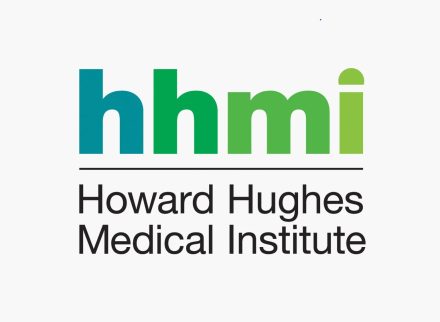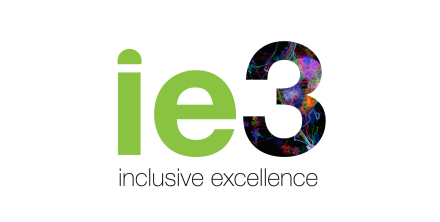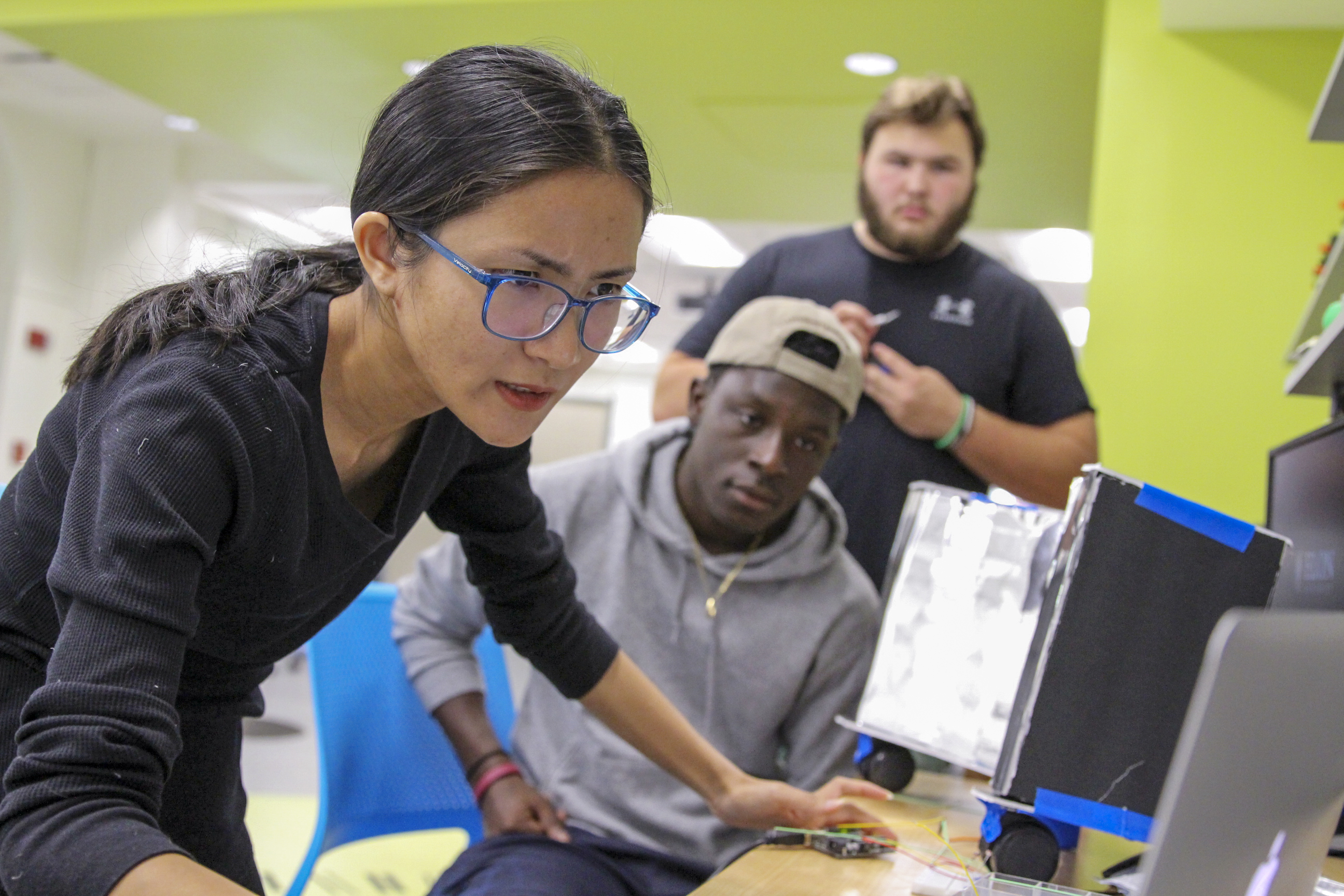The $377,800 grant from the Howard Hughes Medical Institute is designed to improve introductory science experiences for undergraduate students and increase retention of talented STEM students.
A six-year, $377,800 grant from the Howard Hughes Medical Institute will advance inclusion and belonging in Elon University’s STEM (Science, Technology, Engineering and Mathematics) programs as part of a transformational $60 million multi-institutional effort focused on inclusivity in STEM education in the United States.
Elon was awarded the grant through HHMI’s Inclusive Excellence 3 initiative and is a member of a 14-institution Learning Community Cluster that will collaborate to pioneer systemic changes in STEM education by developing inclusive teaching models that grow success for students from all backgrounds. HHMI announced the grant awards Wednesday, Nov. 30.
 Elon is among 104 colleges and universities in seven Learning Community Clusters selected by HHMI to receive more than $60 million in Inclusive Excellence 3 grants. Over the next six years, institutions will work to improve introductory undergraduate science experiences and retain talented STEM students. The size and scope of the grants are intended to effect genuine and lasting culture change on campuses of all sizes to increase belonging and success in STEM fields, particularly for students from historically excluded groups.
Elon is among 104 colleges and universities in seven Learning Community Clusters selected by HHMI to receive more than $60 million in Inclusive Excellence 3 grants. Over the next six years, institutions will work to improve introductory undergraduate science experiences and retain talented STEM students. The size and scope of the grants are intended to effect genuine and lasting culture change on campuses of all sizes to increase belonging and success in STEM fields, particularly for students from historically excluded groups.
“This grant will provide support to important efforts already underway at Elon to expose a broader range of students to STEM disciplines and ensure they are drawing upon experiences that will help them excel in these fields,” President Connie Ledoux Book said. “Our Boldly Elon strategic plan makes it a priority to advance more inclusive teaching practices, and this grant helps provide resources in support of faculty as they work toward those important goals.”
The seven Inclusive Excellence 3 clusters are each working toward one of three broad challenges: inclusive first-year STEM experiences, developing and promoting effective inclusive teaching models and practices, and creating partnerships between two-year and four-year schools.
Elon and its cluster are focused on the assessment and implementation of inclusive teaching strategies. That will include professional development opportunities for faculty and staff. Elon’s team is also examining first-year and introductory STEM experiences to explore and redesign curricula and create robust peer environments that build support and community. That work will begin in spring 2023 with Elon faculty and staff assessing teaching practices and student outcomes in STEM.
“This initiative will be transformative in increasing belongingness for students in introductory science courses. It also supports the Boldly Elon strategic plan, particularly the Thrive theme, by enriching the student experience, advancing inclusive classrooms and pedagogies, and enhancing faculty development opportunities for our stellar teacher-scholars,” said Amy Overman, Assistant Dean of Elon College, the College of Arts and Sciences, who coordinated Elon’s grant-application process with Dean of Elon College Gabie Smith.
 Nearly one million students annually enter college intending to pursue STEM majors, but more than half do not complete STEM degrees. Students leaving STEM are disproportionately first-generation college students, students transferring from community college, and students from historically excluded ethnic and racial groups, the institute said.
Nearly one million students annually enter college intending to pursue STEM majors, but more than half do not complete STEM degrees. Students leaving STEM are disproportionately first-generation college students, students transferring from community college, and students from historically excluded ethnic and racial groups, the institute said.
“Sustaining advances in diversity and inclusion requires a scientific culture that is centered on equity,” said Blanton Tolbert, HHMI’s vice president of science leadership and culture. “In science education, increasing the number of individuals from underrepresented backgrounds must go hand in hand with creating inclusive learning environments in which everyone can thrive.”
More than 350 institutions applied for the grant in 2019. Elon was among 108 invited to join the IE3’s seven learning community clusters in early 2021.
Elon faculty on the team that planned and applied for the grant include Assistant Professor of Chemistry Nyote Calixte, Associate Professor of Chemistry Jen Dabrowski, Associate Professor of Engineering Sirena Hargrove-Leak, Associate Professor of Biology Jen Uno, Lecturer in Statistics Ryne VanKrevelen, Assistant Dean of Elon College Amy Overman, Dean of Elon College Gabie Smith, and Vice President and Associate Provost for Inclusive Excellence Randy Williams.
“The intersection of STEM and DEI is generally not intuitive for most people to consider. Our HHMI team, however, has made this intersection more evident to students, faculty, and other community members. This outcome is a reminder that inclusive excellence has a place in all aspects of the teaching and learning industry,” Williams said.
The institutions in Elon’s cluster are Fairfield University, Fisk University, Fort Lewis College, Hamilton College (New York), Oglethorpe University, Otterbein University, Portland State University, Simmons University, University of Alaska Anchorage, University of Iowa, University of Minnesota-Morris, University of New Mexico-Main Campus and Xavier University (Ohio).
The differing sizes and student populations of the institutions collaborating in Elon’s cluster — from large R1 schools, to small colleges with students predominantly from marginalized communities — adds potential for systemic change in higher education, said Jen Uno, who is also associate director of the Center for the Advancement of Teaching and Learning.
“This grant program is a powerful opportunity to shift educational culture and practices as a collective and across different types of institutions,” Uno said. “Having a variety of institutions in our cohort means we can collect data in different ways, to identify areas where each institution can lead, and develop and build on each other’s strengths.”
Elon’s participation in HHMI’s Inclusive Excellence initiatives began in fall 2019 with a $20,000 Faculty Forums grant. That grant resulted in a series of faculty workshops and conferences in 2020-21 focused on supporting student belonging and success in STEM.
Elon began planning and working toward HHMI’s Inclusive Excellence grants in 2015, shortly after the institute issued a call for proposals to broaden participation in STEM studies. Hargrove-Leak led that initial grant proposal process and convened a team of invested faculty and staff from across campus.
“That effort raised awareness on our campus about the challenges that diverse groups of students experience in STEM majors and the challenges underrepresented students face in pursuing STEM majors,” Hargrove-Leak said. Those obstacles included the high cost of STEM textbooks, which prompted some students with fewer resources to change majors, to the need for intentionally supportive spaces and activities.
“It opened our eyes to the needs of these specific populations and placed Elon on this trajectory to be so immersed in this work related to diversity and inclusion in STEM,” Hargrove-Leak said.



